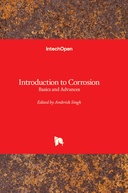Explore

Corrosion refers to the gradual degradation of materials. It occurs in both ferrous and non-ferrous metals. Rust, erosion, wear, galling, swelling, cracking, splitting, and decaying are known forms of degradation. A refined metal undergoes natural corrosion, which changes it into a more stable oxide. By reacting chemically or electrochemically with their surroundings, materials (often metals) slowly deteriorate. The discipline of corrosion engineering is focused on managing and avoiding corrosion. Some metals develop a natural corrosion resistance property known as passivity. This happens when the metal reacts with the oxygen in the air or corrodes in it. The ultimate result is a thin oxide sheet that prevents the metal from continuing to react. In general, corrosion is a process that turns refined metals into more stable substances like metal oxides, metal sulfides, or metal hydroxides. Similar to this, when iron rusts, oxygen and moisture in the air cause the development of iron oxides. According to the science of corrosion, metals transform into considerably more stable chemical compounds like oxides, sulfides, and hydroxides throughout this spontaneous and irreversible process. The book presents research on the basic and advanced aspects of corrosion.
This book is included in DOAB.
Why read this book? Have your say.
You must be logged in to comment.
Rights Information
Are you the author or publisher of this work? If so, you can claim it as yours by registering as an Unglue.it rights holder.Downloads
This work has been downloaded 105 times via unglue.it ebook links.
- 62 - pdf (CC BY) at Unglue.it.
- 43 - pdf (CC BY) at mts.intechopen.com.
Keywords
- adsorption
- coating
- DFT
- Environment
- Erosion
- Industrial Chemistry
- Industrial chemistry & manufacturing technologies
- Surface-coating technology
- Technology, engineering, agriculture
- Toxicity
Links
DOI: 10.5772/intechopen.104001Editions

